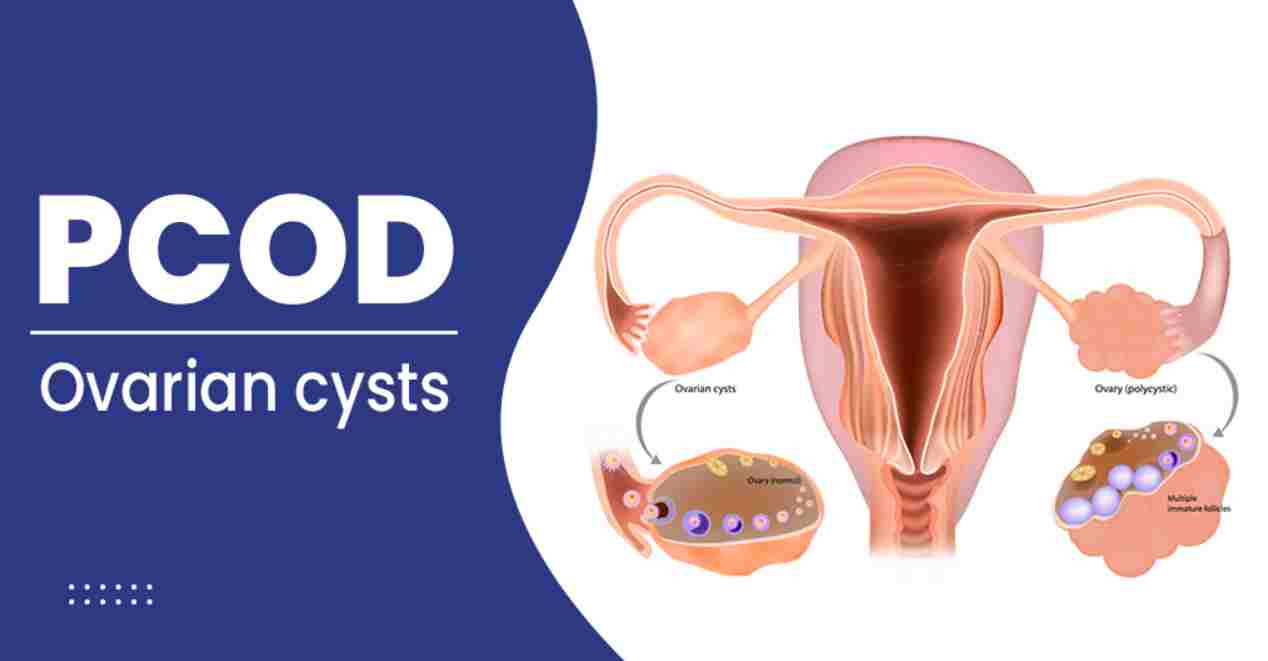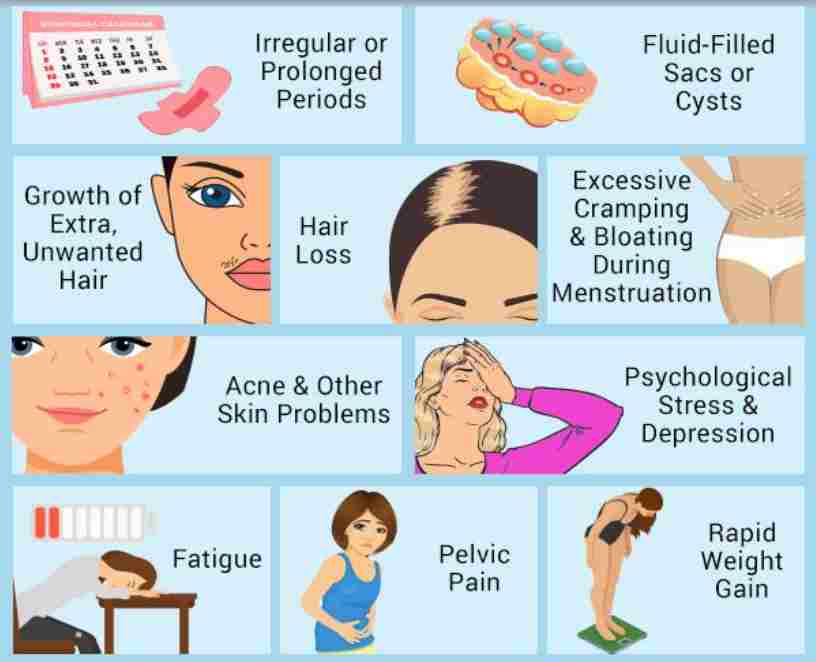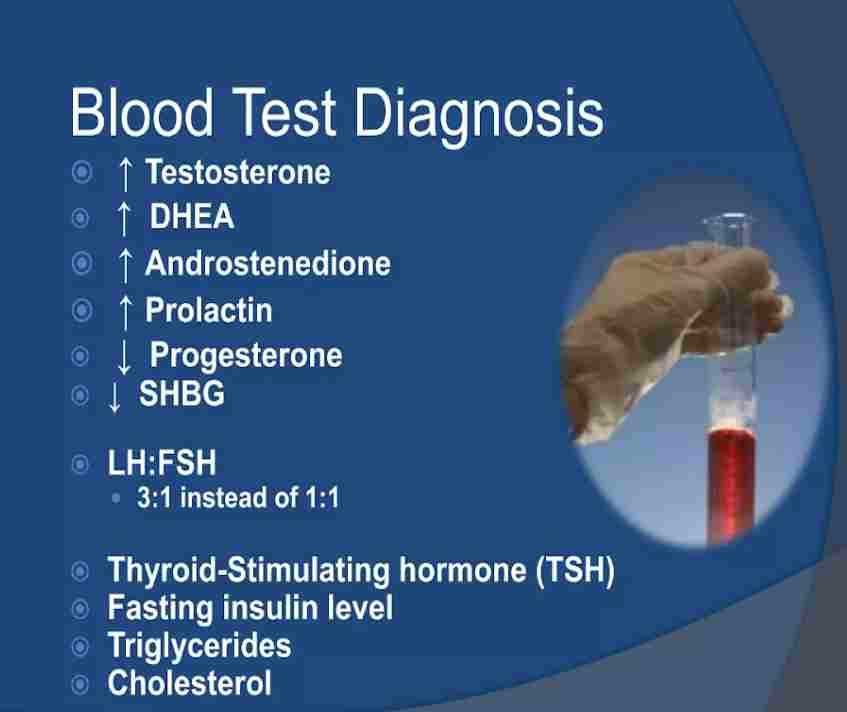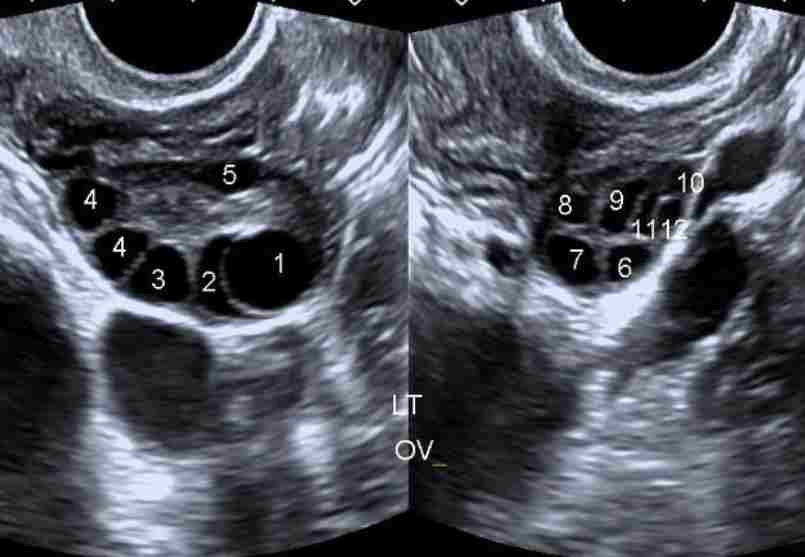
Introduction
The Female reproductive system has two ovaries and an egg is released from each ovary every month alternatively.
PCOD means Polycystic Ovarian Disease.
It is a condition where the ovaries release many immature or partially-mature eggs that eventually turn into cysts.
Cysts are little liquid-filled sacs.
About one-third of women worldwide suffer from PCOD, which means common.
Women who suffer from PCOD experience mild to moderate symptoms. These symptoms can be managed with diet, lifestyle changes, and medication.
PCOD often leaves a lasting impact on women’s physical and mental well-being.
- PCOD doesn’t have severe complications and can heal with the right diet.
Risk Factors Of PCOD
- Overweight
- Obesity
- Family history
- Insulin resistance
- Hyperinsulinemia
- Hyperandrogenism
- Overconsumption of unhealthy diets
Causes Of PCOD
Unhealthy Lifestyle changes: Unhealthy Lifestyle changes like unhealthy food, and lack of proper physical activities and exercises leads to metabolic imbalances and thereby causing (PCOD) Polycystic Ovarian Disease.
Smoking: Smoking can decrease estrogen levels by inhibiting aromatase activity and increase androgen levels in the body thereby causing (PCOD) Polycystic Ovarian Disease.
Alcohol: Alcohol consumption imbalances the estrogen-to-progesterone ratio and hormonal imbalance thereby causing (PCOD) Polycystic Ovarian Disease.
Overweight and Obesity: Being overweight enhances steroidogenesis and hyperandrogenism in women thereby altering the hormones in the body and imbalance thereby causing (PCOD) Polycystic Ovarian Disease.
Family history: Women whose mother or sister has PCOS or type 2 diabetes are more likely to develop PCOD.
Insulin resistance: chronically high insulin in the bloodstream encourages the ovaries to increase the production of androgens and causes other hormones to go out of whack and thereby causing (PCOD) Polycystic Ovarian Disease.
Hyperandrogenism: Females with high androgen levels may develop acne, facial hair and other issues. Increased production of hormones can affect the other hormones, causing (PCOD) Polycystic Ovarian Disease.
Drugs: Antiepileptic drugs, especially valproate, may directly cause PCOS or indirectly lead to the disorder by causing weight gain
Signs And Symptoms Of PCOD

- The common signs and symptoms of PCOD/PCOS problems-
- Irregular periods
- Heavy bleeding during periods
- Cysts
- Excess body hair or unwanted hair
- Acne
- Fatigue
- Abdominal pain
- Hair loss or male pattern baldness
- Difficulty in getting pregnant
- Obesity
- Darkening of skin or pigmentation around the neck
- Sleep disorders
- Depression
- Excessive cramping and bloating during mensuration
Diagnosis Of PCOD
Your gynecologist will start with a physical exam and take a history of your symptoms and later may recommend tests like blood tests and ultrasound.
The physical examination checks:
- Blood pressure
- Body mass index
- Waist size
- Extra hair growth
- Skin discoloration or pigmentation
- Acne
History Taking:
- Family history
- Menstrual history (whether the period is regular? Any pain during the period? Any clots in bleeding? Any abnormal bleeding?)
- Social habits
Blood Tests:

- Blood test includes testosterone, Dehydroepiandrosterone (DHEA), Androstenedione, prolactin, progesterone, sex hormone binding globulin (SHGB), LH:FSH ratio, TSH, triglycerides, cholesterol, and insulin levels.
Pelvic Ultrasound:

- It is to look for cysts in the ovaries and measure the lining of the uterus.
Laparoscopic Examination:-
- It may reveal a thickened, smooth, pearl-white outer surface of the ovary. (This would usually be an incidental finding if laparoscopy were performed for some other reason, as it would not be routine to examine the ovaries in this way to confirm a diagnosis of PCOS.)
Treatment Of PCOD
- Polycystic Ovarian Disease (PCOD) can be treated with the help of several medicines. In rare cases, your doctor may recommend surgery as well. Some of the treatment protocols for PCOD/PCOS include –
- Progestin – Progestin, a synthetic progestogen, is often recommended to correct amenorrhea or the absence of periods.
- Birth control pills – Some birth control pills contain oestrogen and progestin and help reduce the Androgen levels in the body. This helps combat anovulation.
- Letrozole and clomiphene – Letrozole and clomiphene help induce ovulation.
- Metformin – Metformin reduces insulin resistance and helps with weight reduction as well.
- Immature follicle aspiration – Helps reduce the number of immature follicles, improving ovulation.
- Laparoscopic ovarian drilling – Laparoscopic drilling is a minimally invasive surgery that helps lower testosterone levels produced by the ovaries.
- Besides medications lifestyle modifications like diet and exercise plays a key role in curing PCOD
Diet Plan For PCOD
Diet plays a crucial role in curing PCOD, take more natural and fresh foods like leafy vegetables, sprouts, and fruits, and take proteinous foods like soya, beans, and legumes. Let’s the person with PCOD what to eat and what not to eat.
A healthful PCOS diet can also include the following foods:-
- natural, unprocessed foods
- high-fiber foods
- fatty fish, including salmon, tuna, sardines, and mackerel
- kale, spinach, and other dark, leafy greens
- dark red fruits, such as red grapes, blueberries, blackberries, and cherries
- broccoli and cauliflower
- dried beans, lentils, and other legumes
- healthful fats, such as olive oil, as well as avocados and coconuts
- nuts, including pine nuts, walnuts, almonds, and pistachios
- dark chocolate in moderation
- spices, such as turmeric and cinnamon
In general, people on a PCOS diet should avoid foods already widely seen as unhealthful. These include:
- Refined carbohydrates, such as mass-produced pastries and white bread.
- Fried foods, such as fast food.
- Sugary beverages, such as sodas and energy drinks.
- Processed meats, such as hot dogs, sausages, and luncheon meats.
- Solid fats, including margarine, shortening, and lard.
- Excess red meat, such as steaks, hamburgers, and pork.

Let’s see an example of a diet chart for PCOD
Exercises For PCOD

Exercise helps in reducing BMI, maintaining a healthy weight, and keeping more active.
Moderate exercise like brisk walking, jogging, cycling, or swimming is all great activities that can help with PCOS.
A person with PCOD should exercise at least 150mins/ week.
A few simple exercises for squats, leg raises, pushups, crunches, planks, and wall sit at least 20mins can help in PCOD.

- Yoga also plays a good role in PCOD. Some of the best yoga poses for PCOD may include Sethu bandh asana (bridge like pose), Bujangasana (cobra like pose), ardha matsyendrasana (seated half spinal twist like pose), dhanurasana (bow like pose), Nataraja Sana (supine dancing shiva like pose), chakki chalanasana (churning mill like pose), Surya namaskara (sun salutations like pose), Janu sirs asana (one legged seated forward bend like pose).
Complications Of PCOD
Metabolic diseases like high blood pressure, cardiovascular diseases, and increased cholesterol, and blood glucose levels may occur due to PCOD
There may be a chance of Miscarriages even though the people with PCOD are giving birth to babies with proper care.
Infertility may occur.
Gestational diabetes may occur due the insulin sensitivity.
Alterations in sex steroids (i.e., high androgen and low estrogen levels) and increased visceral adiposity in PCOS could potentially contribute to the increased prevalence of sleep apnea in this disorder
Type 2 Diabetes may occur due the insulin sensitivity.
Depression and other mental disorders
Endometrial cancer might occur due to more exposure to much higher amounts of estrogen causing the endometrium to grow much thicker than normal. This is what increases the chance of cancer cells beginning to grow.
Abnormal uterine bleeding.
Untreatable acne, displaying hormonal problems.
Chronic Liver inflammation
Difference Between PCOD And PCOS
Let us look at how we can differentiate between PCOD vs PCOS.
PCOD | PCOS |
PCOD is a medical condition where the women’s ovaries produce immature or partially impure eggs, which transform into cysts. | PCOS is a more severe condition where the ovaries produce a high quantity of male hormones, resulting in excess cyst formation. |
About one-third of women worldwide suffer from PCOD, which means common. | PCOS is a disease that affects fewer women than PCOD. |
PCOD does not affect fertility in women. In about 80% of the cases, women can conceive with little help and medications. | PCOS affects female fertility adversely. As the woman is not ovulating regularly, it is difficult to conceive. Even if they do, there is a risk of miscarriage, premature birth, or complications during pregnancy. |
PCOD has no serious complications. | Type 2 diabetes, high blood pressure, heart disease, and advanced endometrial cancer are serious complications associated with PCOS. |
PCOD doesn’t have severe complications and can be healed with the right diet plan. | While polycystic ovary syndrome (PCOS) cannot be cured, the symptoms can be controlled through lifestyle changes and medicines. |
PCOD does not release as many male hormones as PCOS, the symptoms are less frequent and rarely noticeable. | Women suffering from PCOS often struggle with the symptoms from a younger age. |
PCOD sufferers are not threatened with such issues. | PCOS is inherently a metabolic disorder. This means it is often accompanied by a greater risk of developing high blood pressure (hypertension), diabetes, cardiovascular diseases, obesity, and cancers of the uterus and breast. |
Women who suffer from PCOD experience mild to moderate symptoms. These symptoms can be managed with diet, lifestyle changes, and medication. | Women suffering from PCOS may require infertility treatments and active treatment protocols to manage other health conditions that they may develop. |
Advice
- If you experience any of the symptoms associated with PCOD, it is important to consult an expert gynecologist for a proper diagnosis and PCOD problem treatment. In addition, your gynecologist may refer you to an endocrinologist or a cardiologist to help manage other health conditions that you develop due to PCOS.
Top 13 Interesting Facts About PCOD
Studies also report that by the age of forty, approximately fifty percent of women with PCOD would develop pre-diabetes or would already be diabetic, while many others would face infertility during their childbearing age.
About one-third of women worldwide suffer from PCOD, which means common.
Sleep disturbances have been found to be twice as common in women with PCOD compared with those without PCOD.
Women with PCOS may have more difficulty breastfeeding and producing sufficient milk for their babies.
Fertility challenges does not occur in 60-80% of women with PCOD.
PCOD does not release as many male hormones as PCOS, the symptoms are less frequent and rarely noticeable.
women with PCOD have reduced postprandial CCK secretion and deranged appetite regulation associated with increased levels of testosterone. Impaired CCK secretion may play a role in the greater frequency of binge eating and overweight in women with PCOD.
Women with PCOS are three times as likely to miscarry in the early months of pregnancy as women without PCOS.
PCOD is a condition in which ovaries produce many immature or partially mature eggs whereas PCOS is a metabolic disorder and a more severe form of PCOD can lead to anovulation where ovaries stop releasing eggs.
Inositol is a B vitamin that can help improve insulin resistance in both PCOD and PCOS.
PCOD is mostly due to unhealthy lifestyles, unhealthy diets, and lack of exercise.
Specifically, if your abdominal circumference is more than 88 cm (35 inches), then it could be a subtle sign you may have PCOS.
Diet and exercise play a crucial role in treating PCOD.






